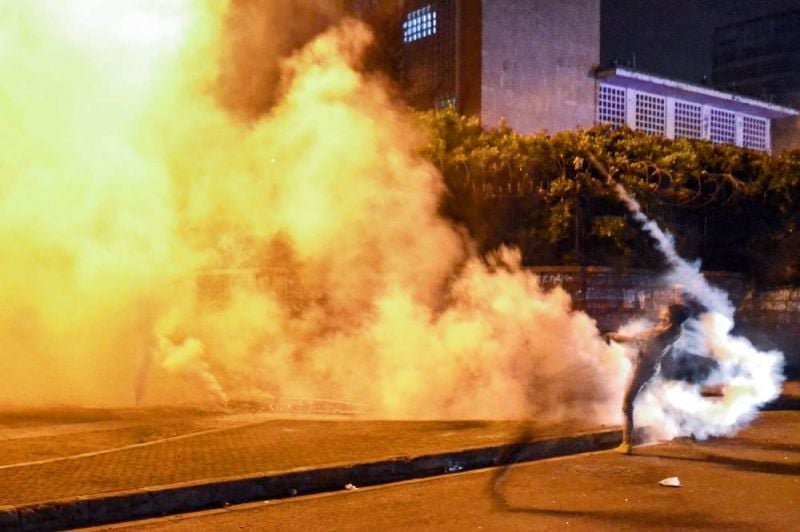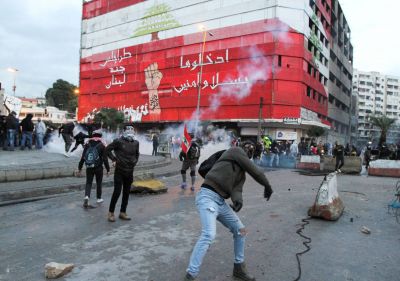
An anti-government protester hurls a tear gas canister back toward security forces amid clashes in Tripoli. (Credit: Fathi al-Masri/AFP)
The days of friendly slogans and patriotic chants in Abdel-Hamid Karami Square seem now a long way off.
Automatic weapons, Molotov cocktails and grenades: these have characterized violent riots that have rocked Tripoli, the country’s second-largest city, since Jan. 25.
Hundreds of young people have taken to the streets in the center of the northern city, sparking clashes with the army and security forces.
Last Wednesday, some 220 people were injured in the confrontations, which left one person dead, a 30-year-old man from the impoverished Bab al-Tabbaneh neighborhood. He reportedly succumbed to injuries as a result of a bullet wound to the chest.
Calls for calm from the army and Prime Minister-designate Saad Hariri did little to subdue tensions, as confrontations continued throughout the week and over the weekend.
“They blew up Beirut and now they judge us for throwing stones. Stones are the only means we have left to express our despair,” a young Tripolitan shouts in anger on television.
“Where are the [state] institutions, where are the politicians? In Beirut. Here there is no one to represent us. We want representatives elected by the people to fight for our rights,” he adds.
The city of Sunni tycoons has become a hotbed of political protest since 2019’s Oct. 17 uprising. Prior to the popular revolt, the city’s walls and streets were adorned with pictures of MPs and politicians. Not anymore. Tripoli appears to have become politically orphaned.
“The young people who are taking to the streets have nothing else to lose. Sunnis in Tripoli have no political leadership. The city is completely abandoned,” says Sheikh Bilal Dakmak, president of the Iqraa Association for Social Development in the city.
No political leader seems to be able to keep the city in check, although Tripoli has no lack of prominent politicians, including Najib Mikati, a former prime minister and, with his brother, one of Lebanon’s two wealthiest men. One also ought to mention former finance minister and billionaire Mohammad Safadi, former Justice Minister Ashraf Rifi, as well as MP Faisal Karami. This is not to mention, of course, Hariri’s Future Movement, which includes several prominent Tripoli politicians.
“Mikati spends most of his time in London and Safadi in Monte Carlo,” says Misbah Ahdab, a former MP for the city. For his part, Yahya Mawloud, an independent politician in Tripoli, believes that “politicians are businessmen and only help the people when it serves their electoral interests.”
Tripoli “is at the heart of a class conflict,” he adds.
Marginalized by the central government since Lebanon’s independence, Tripoli has been suffering from a lack of state investment, which the local tycoons compensated for in part through clientelistic policies.
But this logic no longer applies at a time when the poverty rate has hit record levels.
“Politicians have limited impact. Charities cannot replace the state. Needs are so pressing that no party is able to meet the most basic demands of the population,” admits a close associate of Mikati.
“We knew that the situation was going to get out of hand, it was inevitable,” says Moustafa Allouche, a vice president of the Future Movement.
‘If Hariri is back in business’
A large portion of Tripoli’s population, including traders, drivers, workers and street vendors, live off daily wages. Since Jan. 14, Lebanon has been under a strict countrywide lockdown that has shuttered all nonessential businesses and banned most vehicular traffic, and financial aid to the most destitute is delayed and limited — a fatal blow to what remained of the local economy.
The large northern city is also suffering the full brunt of the social repercussions of the unprecedented financial crisis gripping the country. In 2019, the unemployment rate in some of the city’s neighborhoods already stood at 60 percent, according to the United Nations.
While political leaders appear to be increasingly overwhelmed by the situation, many accuse them of using the protests to serve their own interests.
Chadi Nachabe, a member of Tripoli’s city council who ran for Parliament on the Future Movement’s list in 2018, describes the situation as a standoff between the different political parties in the local arena, pending a new regional deal between the United States and Iran, which would have direct consequences for Lebanon.
Geopolitical analyses can sometimes be far-fetched, but Lebanon is so embroiled in local and regional clientelistic logic that such readings cannot be easily dismissed.
The Free Patriotic Movement, founded by President Michel Aoun, has also implicitly accused Hariri of standing behind the protests, while the formation of a cabinet remains at a standstill.
“Talk about Hariri maneuvering to put pressure on Aoun is baseless. The president couldn’t care less if Tripoli burns down,” Allouche claims.
He goes on to say that the Future Movement “can do nothing for Tripoli. But if Hariri is back in business, he will be able to bring aid to the city.”
For Dakmak, “no politician is controlling these protest movements.”
Meanwhile, Ahdab believes that the security forces and intelligence services could nevertheless play a political role in the protests. These apparatuses, affiliated with different political camps, are waging a merciless war to control the city, according to him.
“Every night, there are cars driving around from which people shoot in the air to intimidate the population,” Ahdab says.
This article was originally published in French by L’Orient Le-Jour. Translation by Sahar Ghoussoub.
